"Extra-legal occupation" of Venezuela's Torre David tower ends in forced evictions
News: the Venezuelan government is forcibly evicting hundreds of families from Torre David, the abandoned skyscraper in Caracas, Venezuela, that squatters have turned into a role model for informal communities.
The evictions have been criticised by Urban-Think Tank, whose research into the repurposed office tower was awarded the Golden Lion at the 2012 Venice Biennale.
"Two months after the government of Nicolas Maduro announced its intention to work with the community of Torre David to improve living conditions, it has begun a process of transformation that begins with eviction," said Urban-Think Tank.
"Our concerns do not arise from a desire to see Torre David remain as it is, but because the details that have emerged do not necessarily suggest a positive outcome for those affected."
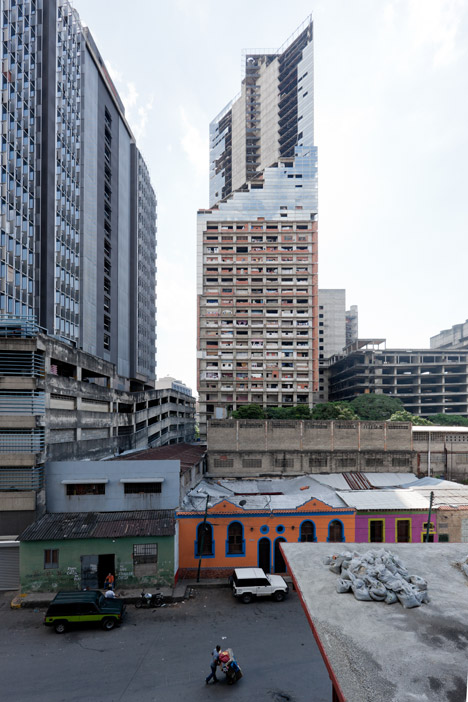
Reports emerged last week that the Venezuelan government was in talks with Chinese investors interested in purchasing the 45-storey building, which was originally designed for a financial organisation in the 1990s, but left unfinished after the death of the developer.
City officials have now begun moving out some of the many families that have been living in the tower for the last seven years, to ultimately be relocated in Cúa – a city over 50 kilometres outside the capital.
Led by government minister Ernesto Villegas, the relocation is being carried out floor-by-floor, with inhabitants currently being moved to temporary housing solutions. Between 1,000 to 2,000 families are believed to be affected.
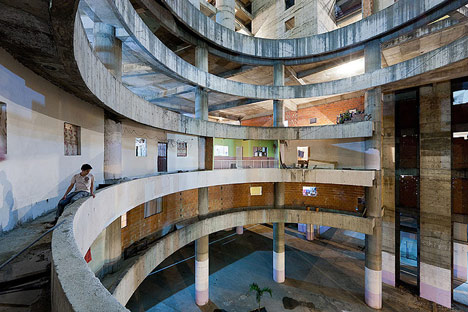
Urban Think-Tank says the move highlights that the lack of social housing in the city and the failure of large-scale public projects, particularly in slum clearance and the relocation of impoverished communities.
"The commercial housing market simply does not supply enough homes. There are too few units of social housing, and the majority of these are far beyond the reach of low-income families," added the team.
Urban Think-Tank worked with curator Justin McGuirk and photographer Iwan Baan on their year-long Torre David research project, which presented the squatters' community as a model for informal settlements around the world.
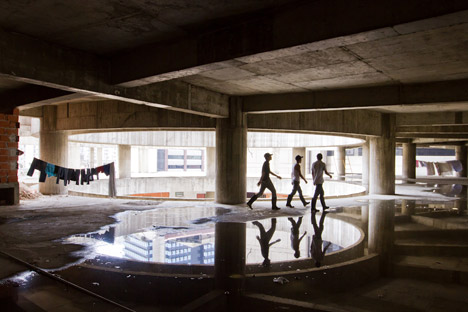
"We strove to focus greater attention on the story and situation of Torre David because we believed that there was something valuable to learn from what the residents created in seven years of extra-legal occupation," said the team.
"What we found was neither a den of criminality nor a romantic utopia. Torre David is a building that has the complexity of a city. It merges formal structure and informal adaptation to provide urgently needed solutions, and shows us how bottom-up resourcefulness has the ability to address prevailing urban scarcities."
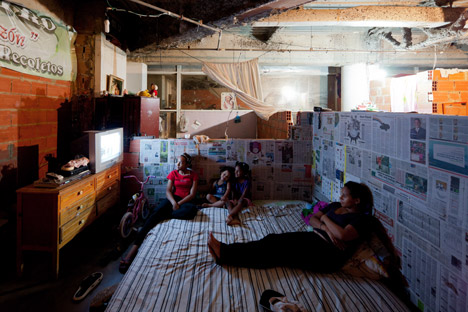
"We hope that the same mistakes of slum eradication made by governments around the world for the past 60 years are being heeded," said Urban-Think Tank of the forced eviction process.
"Past failures have consistently perpetuated or exacerbated systemic poverty."
Photography is by Iwan Baan.
Read on for the full statement from Urban-Think Tank:
We at U-TT have been closely following recent news coverage regarding Torre David's redevelopment. As reported in both local and international press, the Venezuelan government has struck an agreement with Chinese investors to restore the complex of buildings to their original purposes - a commercial centre and office tower. With surprising speed, the government initiated the eviction process of residents two days ago and have declared their intention to relocate all 1,200 families to a new social housing project by September.
From 2011-2012, our research and design team was heavily engaged in Torre David. We saw it as a misunderstood and important place within the physical and social geography of not just Caracas or Venezuela, but Latin America and perhaps even the urban planet as a whole.
When dealing with informal settlements, infusions of money for major public works and other approaches that involve large-scale rapid change – such as the razing of slums and relocation of poor populations – have generally failed in the complex setting of the city. The commercial housing market simply does not supply enough homes. There are too few units of social housing, and the majority of these are far beyond the reach of low-income families. The dire asymmetries of capital in the global south do little to help; yet various forms of structural neglect have not always diminished great entrepreneurial vigour. Shunned by governments and the formal private sector, city dwellers, like those in Torre David, have devised and employed tactics to improvise shelter and housing.
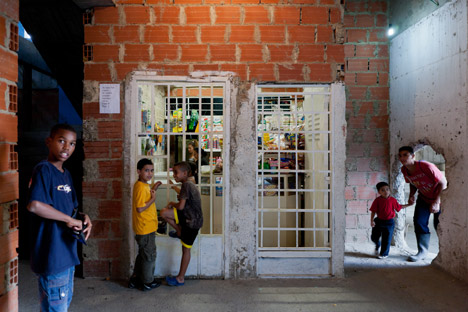
In Latin American cities, most urban space is already built up, or over built. There is limited room for new buildings, and existing buildings are at times partially occupied or inefficiently used. We believe that the solution lies not in demolishing buildings and building anew, but in making a more efficient, strategic and appropriate use of what already exists to meet ever-changing needs. This can be through reusing and recycling, or providing agency and visibility to inhabitants already engaged in such processes.
After months of documentation, analysis, discussions with residents, and design proposals at Torre David, we publicised our work through a variety of means - exhibitions, a book, a short film, and lectures. We strove to focus greater attention on the story and situation of Torre David because we believed that there was something valuable to learn from what the residents created in seven years of extra-legal occupation. What we found was neither a den of criminality nor a romantic utopia. Torre David is a building that has the complexity of a city. It merges formal structure and informal adaptation to provide urgently needed solutions, and shows us how bottom-up resourcefulness has the ability to address prevailing urban scarcities.
Now, two months after the government of Nicolas Maduro announced its intention to work with the community of Torre David to improve living conditions, it has begun a process of transformation that begins with eviction. We are holding our breaths, like many of the residents, as they wait to see the precise results of the government's scheme. Our concerns do not arise from a desire to see Torre David remain as it is, but because the details that have emerged do not necessarily suggest a positive outcome for those affected.
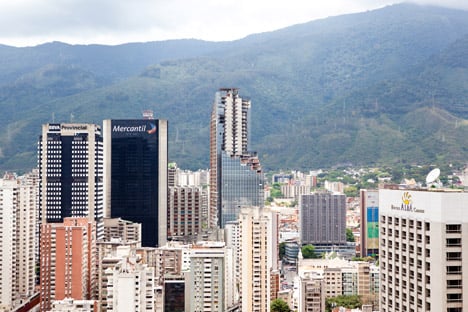
What we do know is that of the nearly 100 families that have already been removed from Torre David, all are being sent to government-built housing in a small city over 50 km from Caracas. We hope that the same mistakes of slum eradication made by governments around the world for the past 60 years are being heeded. Not only with regards to residents receiving humane treatment and being provided with appropriate opportunities to raise their families in safe and secure environments, but also in ensuring authorities prevent the dislocation of established social networks and livelihoods linked to employment opportunities in adjacent areas. Past failures have consistently perpetuated or exacerbated systemic poverty.
Moreover, we hope that whatever redevelopment plan the government and investors formulate, they strive to turn Torre David into a site for social – not just economic – change within Caracas. We saw the potential of the monumental structure, its geographic location, and creative re-programming, as an opportunity for innovative and inclusive development. Ernesto Viellgas, the Minister of State for the Revolutionary Transformation of Greater Caracas, announced that the government's actions are not motivated by commercial interest, but rather by humanitarian concerns. For the sake of Caracas, we hope this to be the case.